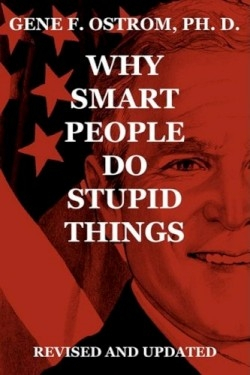Why Smart People Do Stupid Things
There’s little question that smart people including presidents do stupid things. In fact the smarter the person the dumber certain behaviors appear. While most people merely shake their heads in disbelief that an otherwise smart president would have an affair with a seductive intern psychologist Gene F. Ostrom asked why. He explains puzzling behavior in Why Smart People Do Stupid Things.
Ostrom liberally applies the word “stupid” when behaviors warrant. His prime examples of smart/stupid people are those in leadership roles such as presidents George W. Bush Bill Clinton and Richard Nixon.
He postulates that the fall from smart behavior by these men was based on their upbringing and early life. Ostrom develops his case by suggesting that Bush’s psychological profile shows he is narcissistic. “Few character traits can be more dangerous than this one because it can be readily disguised” he writes.
Now retired Ostrom bases his assertions on his studies and forty years in clinical practice. His experience as a psychotherapist teacher and director of a mental health outpatient clinic give him understanding of the complexity of human nature. He acknowledges the potent forces within individuals that include biological and sexual drives habits and a person’s responses to situations.
Ostrom’s far-reaching book in its revised and updated edition goes beyond the presidential case studies. He shares his life views on a variety of subjects many of which are drawn from years of research. He discusses the future of education the theories and contributions of great thinkers the importance of linguistics (“Stupid acts of smart people have a lot to do with their speech.”) psychology and religion.
Unfortunately the book is riddled with errors that are an overwhelming distraction to absorbing Ostrom’s message. These include misspelled names (“Diedrich Bonhoffer” is actually “Dietrich Bonhoeffer”) punctuation and spelling errors (“Just the facts Mam”) and facts (Ostrom defines Hull’s letter symbols S-R-O as “subject” “response” and “organism” when S stands for “stimulus”).
Curiously Ostrom apparently used the index from his previous longer edition rather than generating a new one for this book. Thus entries don’t match the specified pages or they refer to other nonexistent ones.
It’s easy to make writing mistakes. Smart editing helps catch them.
Distractions aside Ostrom is on target when he encourages readers to better know themselves—especially their shadow side—and be willing to change their own behaviors.
He writes “Are we intelligent human beings going to minimize the making of stupid mistakes? Are we going to realize our potential before it’s too late for us individually and for humankind collectively? If we decide to do so we must dig deeply within ourselves for answers.”
Ostrom urges readers to devote themselves to making profound changes in individual and collective conduct and his book provides ideas on how to do just that.
Disclosure: This article is not an endorsement, but a review. The publisher of this book provided free copies of the book and paid a small fee to have their book reviewed by a professional reviewer. Foreword Reviews and Clarion Reviews make no guarantee that the publisher will receive a positive review. Foreword Magazine, Inc. is disclosing this in accordance with the Federal Trade Commission’s 16 CFR, Part 255.

